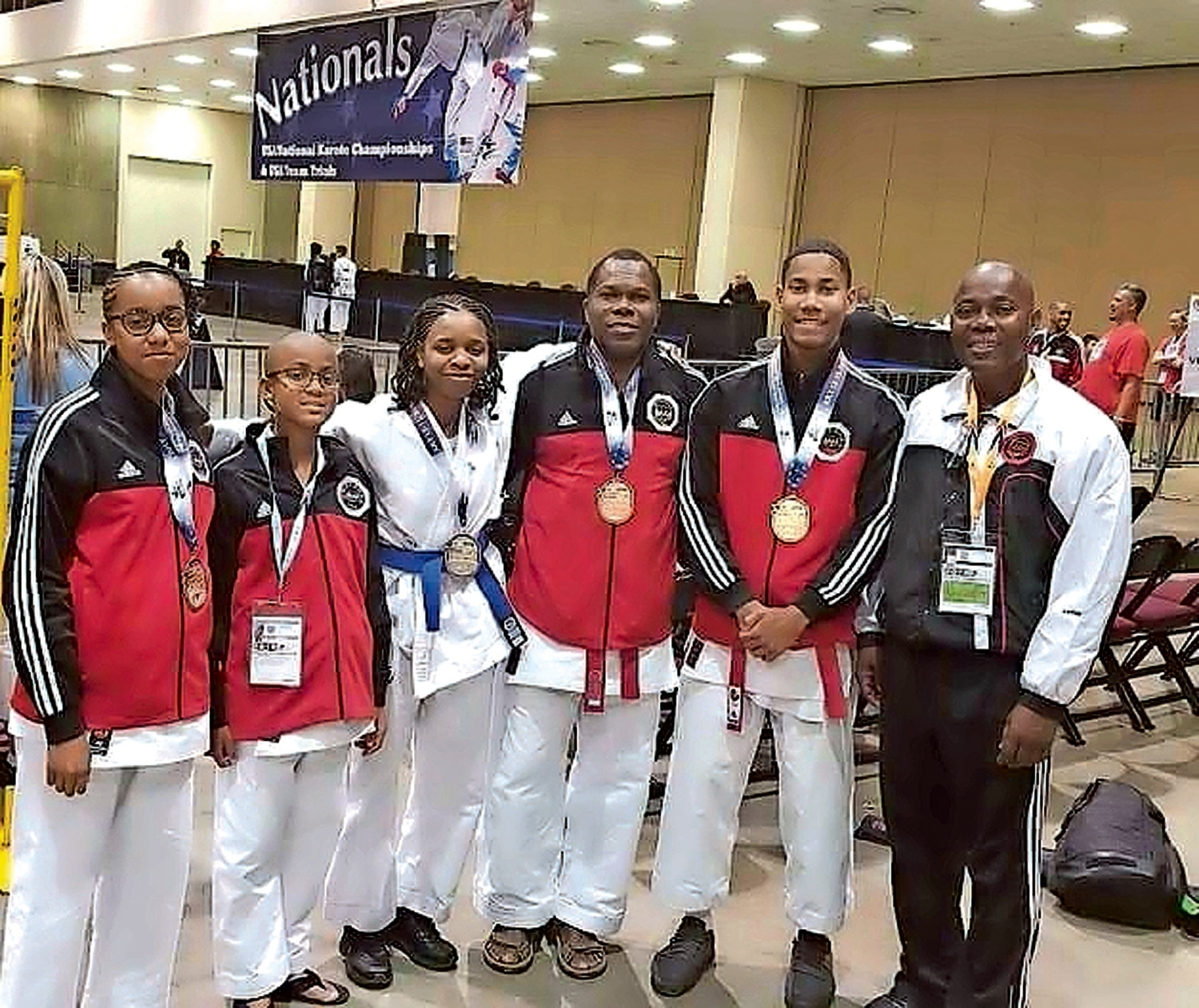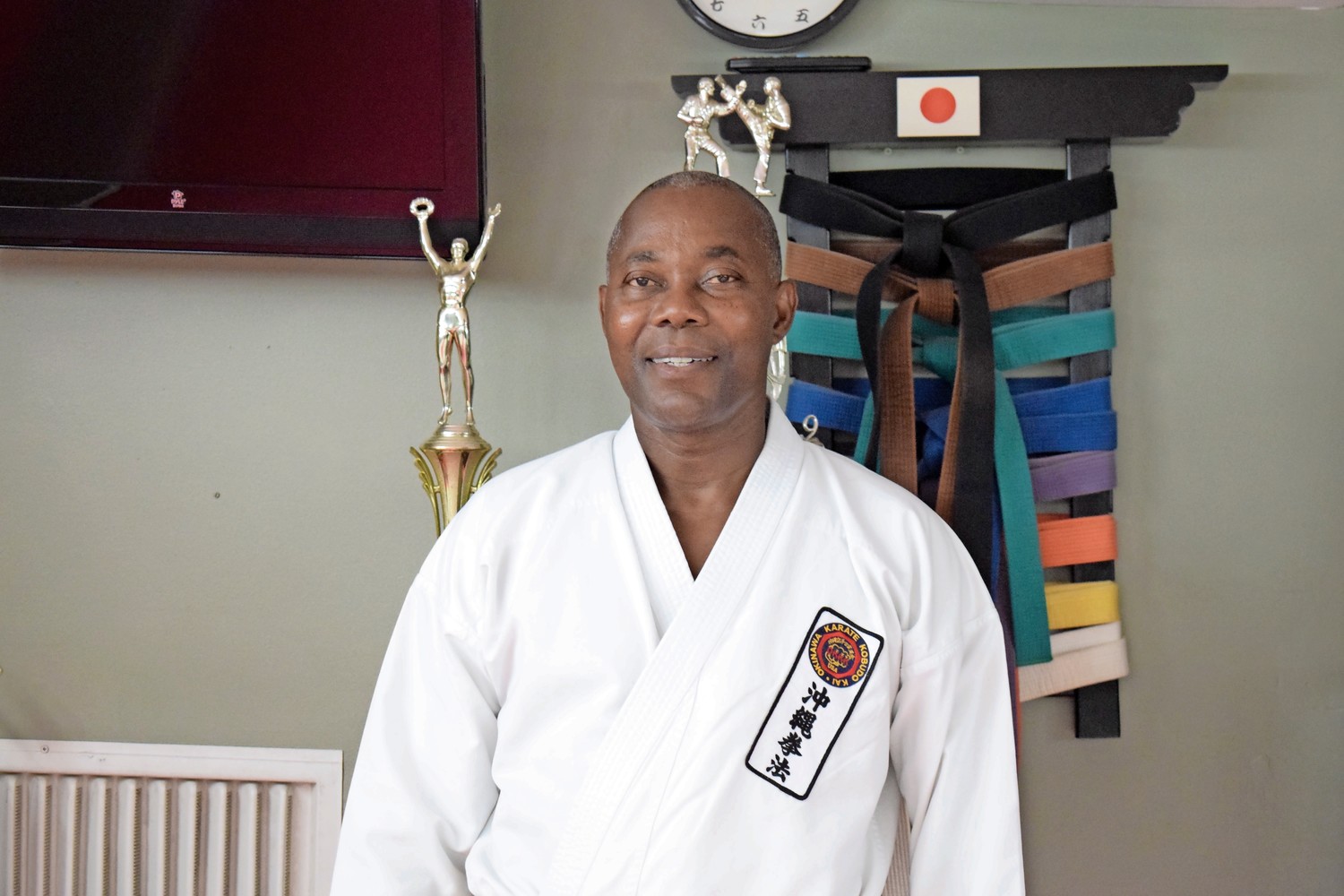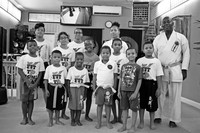Karate dojo shines at nationals
Instructors push for athletic, academic excellence
As the contestants prepared to compete in the 2018 USA National Karate Championships and Team Trials in Reno, Nev., last month, one team stood out from the dozens of martial arts schools that took part Elmont’s Okinawa Karate Kobudo Kai team, a perennial favorite to take home several medals, had only five members to represent the dojo in this year’s championships.
The team, which usually fields about 20 contestants, faced several obstacles and setbacks on its way to Reno. Several of the team’s newer members began training only a few months ago, and were not ready to compete in the tournament. Of those who were ready, hectic summer schedules had scattered them throughout the country on vacations with family and friends.
“We also needed to pay for about $2,700 in tournament fees for our team, and parents pitched in for the airfare and hotel and food costs,” Denise Lyn, OKKK’s manager, said.
The dojo was, however, able to raise enough money through its nonprofit Youth Empowerment Karate Team Inc., and donations from local elected leaders such as State Sen. Elaine Phillips. With the funds in hand, OKKK’s Magic Five team went off to Reno and garnered five medals in kobudo, kata and kumite — weapons, forms and sparring.
“Because the five that competed were in different age categories, we couldn’t compete in a lot of the team events that we would have normally won,” OKKK founder Serge Clark said. “To be honest, a team of five in our school can usually win about 15 medals.”
“Although I was young and loved the action, I saw a deep meaning behind martial arts, the philosophy that came with it,” Clark said.
In his imagination, martial arts represented a commitment to self-improvement, to dedicating time to become not only physically fitter, but also mentally stronger. When Clark joined the Navy as an aviation electronics technician and went aboard the USS Midway with the VF-154 company, he found himself in Japan, the birthplace of karate
and what would be his own Okinawa Kenpo style.
After training in Japan, Clark moved to Hawaii in 1990, where he trained with the Japan Karate-do Maruyoshi Kai School and eventually opened his own dojo and limousine company. But his work suffered, like many other businesses in Hawaii, after the 1997 Asian financial crisis hit the local economy. Clark sold his vehicles and moved to Long Island with his family.
He initially taught karate in Hempstead, but the low turnout and high rents in the area forced him to look for a more economical community. He found it in Elmont.
Clark opened two OKKK dojos, on Elmont Road and Dutch Broadway, ultimately moving all his operations to the second site. The dojo would eventually enroll more than 100 students each year, and he began offering yoga and kickboxing classes as well. As Clark’s clientele grew, he knew he needed help managing his business. That was when Lyn came in.
“I started out as just the parent of a student, and Sensei Clark asked me to be the office manager, because he knew I had a marketing background,” she said.
Although Lyn was apprehensive at first, she committed to the dojo when she saw the positive effects that training had on her children. She said her son, Anderson, had always been soft-spoken and shy, but he matured as a result of his practice and even competed in Reno with the team. And Lyn said the same confidence grew in her daughter, Jada, who won gold and silver medals in weapons and another silver medal in forms in Reno.
“My daughter even made two friends during these tournaments, who she still keeps in contact with,” Lyn added.
And hers are not the only children who have seen improvements thanks to their time in the dojo. Last year, two brothers, Christian and Cameron Johnson, joined the dojo after their mother, Shaleah, grew concerned about their behavior at home and school, she said. Clark instilled his passion for structure and discipline in the boys, and because his rules dictate that his students must work hard in school, the boys became model students. Their mother said she even received a call from the school telling her to keep up whatever she was doing with her sons.
“I never thought I would have seen the changes so quickly, and now others are seeing a change in them,” Johnson said. “It makes my heart smile.”
Clark said that one of the most important lessons he learned as an instructor was to invite the parents into the karate process. Unlike in Japan or Hawaii, Clark found that parents in this country were much less involved in their children’s training, which resulted in his students lazing about at home, which prevented them from growing as martial artists. This frustrated Clark, and he realized that it made him push his students too hard whenever they made mistakes or acted up during classes.
So he created a contract for parents to sign when they enrolled their children in the dojo, promising to encourage them to practice at home and focus on their studies. With support at home and in the dojo, Clark found the formula to help his students grow and see martial arts in the same light as he had when he was young.
“Learning martial arts is about striving and goal setting,” Clark said, “about reaching those goals and yet realizing how much more there is to learn and setting new goals — never tiring of the desire to improve yourself and never quitting.”

 48.0°,
Overcast
48.0°,
Overcast 









